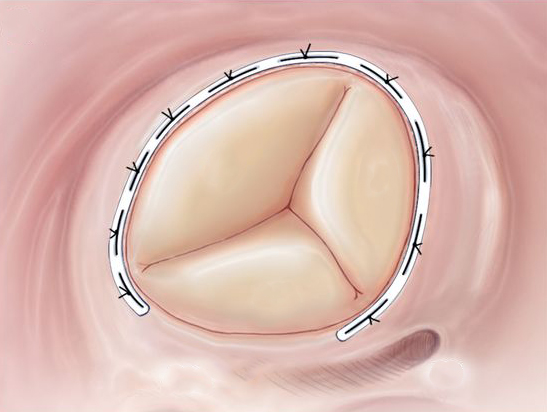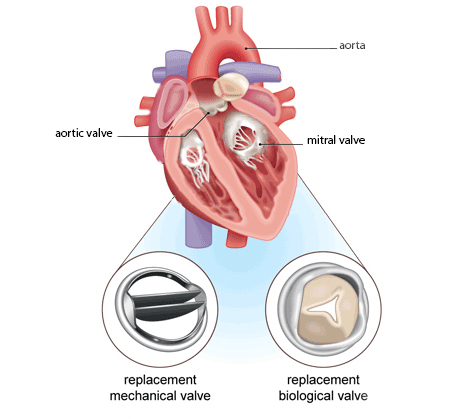Tricuspid valve disease
The tricuspid valve is the valve between the right chambers of the heart (right atrium and right ventricle). The most common tricuspid valve disease is the tricuspid regurgitation (leaking valve).
A leaking tricuspid valve during the first stage of the disease can be asymptomatic, which mean it may not be appreciated. Only when it becomes severe, it causes symptoms like shortness of breath, tiredness, palpitations, dizziness and leg oedema (swollen legs). The tricuspid valve disease can be caused by several conditions, usually by prolapse or rupture of one of its three leaflets or enlargement of its annulus (ring). Sometimes it is caused by other conditions like endocarditis (infection of the valve) or enlargement of the heart (functional tricuspid regurgitation).
Sometimes without treatment the tricuspid regurgitation can remain silent for years. At an advanced stage it may starts to produce symptoms, in which case it might require intervention. The best treatment for severe tricuspid regurgitation is a surgical operation of tricuspid valve repair, which allows to preserve and fix the valve. It is often associated with other heart procedures, like together with mitral valve repair. Repairing the tricuspid valve is always the best option, because it gives the best results. The surgical operation is normally performed opening the breast bone, but it can also be done with a small cut (keyhole – mini thoracotomy). To repair the tricuspid valve (fix the valve), usually a ring is used to tighten the valve (annuloplasty ring) and sometimes new strings (chordae) to support the leaflets. Rarely, when the valve is damaged, it needs to be replaced and a new valve is implanted. Mr Alberto Albanese has a good experience of tricuspid valve repair. He has attended several international conferences and training courses.

Valve choices
There are two option for a new valve prosthesis: mechanical and biological (tissue) valves. The mechanical valves don’t normally degenerate and usually last lifelong, but require anticoagulation (warfarin), a blood thinner. The tissue valves are made from animal tissues, pigs or cows, are similar to human valves; for this reason they don’t require warfarin, but unfortunately can wear away. Studies demonstrates that they can last 10-15 years and then need to be replaced.

Mr ALBERTO ALBANESE
Home
About Me
Services
Coronary Artery disease (blocked arteries)
Aortic valve disease
Mitral valve disease
Tricuspid valve disease
Aortic aneurysm
Atrial septal defects
Cardiac tumours
Arrhythmia (irregular heart rhythm)
International Heart Clinic
Locations – The Harley Street Clinic
Locations – Essex Cardiothoracic Centre
Locations – Italy
Contacts
- Privacy Policy and Cookies
- 2020 of Alberto Albanese
Mr ALBERTO ALBANESE
Home
About Me
Services
Coronary Artery disease (blocked)
Aortic valve disease
Mitral valve disease
Tricuspid valve disease
Aortic aneurysm
Atrial septal defects
Cardiac tumours
Arrhythmia (irregular heart rhythm)
International Heart Clinic
Locations – The Harley Street Clinic
Locations – Essex Cardiothoracic Centre
Locations – Italy
Contacts
Mr ALBERTO ALBANESE
Home
About Me
Services
Coronary Artery disease (blocked arteries)
Aortic valve disease
Mitral valve disease
Tricuspid valve disease
Aortic aneurysm
Atrial septal defects
Cardiac tumours
Arrhythmia (irregular heart rhythm)
International Heart Clinic
Locations – The Harley Street Clinic
Locations – Essex Cardiothoracic Centre
Locations – Italy
Contacts
- 2020 of Alberto Albanese
- Privacy Policy and Cookies

